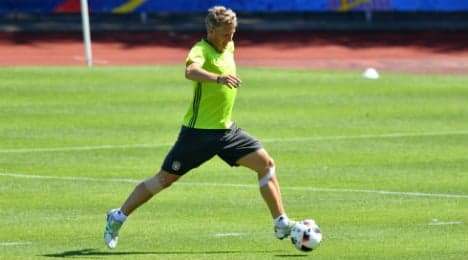Schweinsteiger fit for start in semi

Captain Bastian Schweinsteiger will make his first start of Euro 2016 in Thursday's semi-final against France,
coach Joachim Löw has confirmed.
The Manchester United star suffered a knee strain in Saturday's quarter-final penalty shoot-out win over Italy, but has recovered in time to face France in Marseille.
"In a game like this, his experience is very valuable and, in any case, he will start," confirmed Löw on Wednesday.
"He will be involved. The injury is as good as cured and he is very, very important for our team."
After recovering from tearing the medial ligament in his right knee in March, all of Schweinsteiger's four appearances so far at this European Championship finals have been off the bench.
The 31-year-old netted with only his third touch off the ball late in Germany's 2-0 win over Ukraine in their opening game.
Schweinsteiger came on for Sami Khedira in the first half of the win over Italy and aggravated his right knee problem in the process, but Germany's medical staff have declared him fit to face the French.
Germany squeezed through 6-5 on penalties against Italy after the match ended 1-1 after extra time, although Schweinsteiger drilled his spot kick over the bar.
Schweinsteiger will win his 120th cap at Marseille's Stade Velodrome and will partner Toni Kroos in central midfield with Khedira ruled out by a groin injury.
But Löw gave away no other clues as to who will replace injured striker Mario Gomez or centre-back Mats Hummels, who is suspended.
"I have the line-up in my head and have answered a few questions I had in the last few days," said Löw cryptically.
"We are going to have to be compact and close down the space in defence.
"France are going to be the toughest opponents we have had in the tournament until now.
"The game will be similar to 2014 (when Germany won 1-0 in the World Cup quarter-finals) and France have improved since then."
The world champions have had a day longer than France to recover from the quarter-finals.
While Germany needed 120 minutes and penalties to beat the Azzurri, France dispatched Iceland 5-2 on Sunday over 90 minutes.
"If you compare the two quarter-finals, we had a more intensive game than France," said Kroos.
"But their game was a day later and in the unlikely case that things go badly wrong for us, I wouldn't use the Italy game as an explanation."
Daytime temperatures in Marseille are expected to hit 32 degrees, but Kroosdid not expect heat to be a factor for the 9 PM kick-off.
"I'm used to playing in warm temperatures in Madrid. I enjoy playing in the heat far more than in the rain," said the Real Madrid midfielder.
Comments
See Also
The Manchester United star suffered a knee strain in Saturday's quarter-final penalty shoot-out win over Italy, but has recovered in time to face France in Marseille.
"In a game like this, his experience is very valuable and, in any case, he will start," confirmed Löw on Wednesday.
"He will be involved. The injury is as good as cured and he is very, very important for our team."
After recovering from tearing the medial ligament in his right knee in March, all of Schweinsteiger's four appearances so far at this European Championship finals have been off the bench.
The 31-year-old netted with only his third touch off the ball late in Germany's 2-0 win over Ukraine in their opening game.
Schweinsteiger came on for Sami Khedira in the first half of the win over Italy and aggravated his right knee problem in the process, but Germany's medical staff have declared him fit to face the French.
Germany squeezed through 6-5 on penalties against Italy after the match ended 1-1 after extra time, although Schweinsteiger drilled his spot kick over the bar.
Schweinsteiger will win his 120th cap at Marseille's Stade Velodrome and will partner Toni Kroos in central midfield with Khedira ruled out by a groin injury.
But Löw gave away no other clues as to who will replace injured striker Mario Gomez or centre-back Mats Hummels, who is suspended.
"I have the line-up in my head and have answered a few questions I had in the last few days," said Löw cryptically.
"We are going to have to be compact and close down the space in defence.
"France are going to be the toughest opponents we have had in the tournament until now.
"The game will be similar to 2014 (when Germany won 1-0 in the World Cup quarter-finals) and France have improved since then."
The world champions have had a day longer than France to recover from the quarter-finals.
While Germany needed 120 minutes and penalties to beat the Azzurri, France dispatched Iceland 5-2 on Sunday over 90 minutes.
"If you compare the two quarter-finals, we had a more intensive game than France," said Kroos.
"But their game was a day later and in the unlikely case that things go badly wrong for us, I wouldn't use the Italy game as an explanation."
Daytime temperatures in Marseille are expected to hit 32 degrees, but Kroosdid not expect heat to be a factor for the 9 PM kick-off.
"I'm used to playing in warm temperatures in Madrid. I enjoy playing in the heat far more than in the rain," said the Real Madrid midfielder.
Join the conversation in our comments section below. Share your own views and experience and if you have a question or suggestion for our journalists then email us at [email protected].
Please keep comments civil, constructive and on topic – and make sure to read our terms of use before getting involved.
Please log in here to leave a comment.